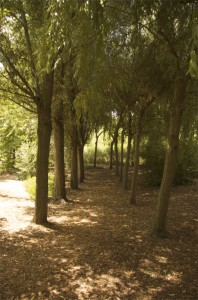It’s that time of year again: flowers, green grass, open windows and local events! Cambridge is taking advantage of renewed springtime energy and is hosting Climate Change Week 2011, a citizen initiative, endorsed by the Cambridge City Council. Events will be taking place May 13th through the 21st during the City’s Go Green Month, with events all across Cambridge. The mission of the week is to encourage residents and the city to join together in celebration of local climate-related accomplishments and proceed with clarity to a better, greener future. A list of events and volunteer opportunities can be found here. Hope to see you there!
Author Archives: Tara Holmes
MA Residents Chime in on Climate Change
The Boston Globe recently reported on an important issue: the perception of the threat of climate change by Massachusetts residents. While the article pointed out that a majority of Massachusetts residents believe climate change is happening – and is caused by human activity – the article also pointed out that many residents remain apathetic on how to address the problem. The MassInc survey, entitled “The 80 Percent Challenge: A Survey of Climate Change Opinion and Action in Massachusetts” was sponsored by the Barr Foundation.
Interestingly, the survey, found that 77% of those surveyed say climate change has probably been happening and 33% believe climate change is very serious and is caused at least partially by human activity. Another 26%, however, believe climate change is real and caused somewhat by humans, yet do not view it as a serious threat. In addition, 24% of residents are unsure climate change is real, or believe it is driven by natural causes, while another 17% say they do not believe climate change is real. Nonetheless, 56% of residents said the federal government should do more to address the issue and 47% said state government should. The survey also broke down responses by demographic and income.
Ben Forman, research director at MassInc, stated that “In order to meet the … state target of 80% reduction of greenhouse gases by 2050 … there will need to be a far greater sense of concern on the part of Massachusetts residents … what is needed in Massachusetts is a real culture of climate protection that fosters action across all sectors of our Commonwealth.”
While Massachusetts remains one of the more progressive states on the topic of climate change, sadly, the U.S. as a whole lags far behind many other countries that consider climate change a real and immediate concern. With this in mind, it’s important to learn all the facts and understand the bigger picture, especially considering the broad, oftentimes overwhelming scope of climate change. What we can do, no matter what, is be aware, be frugal in our energy and water useage and partake in public transit options and car-share options as much as possible. Whether you believe climate change is real, or not, it’s happening all around us and now’s the time to take a positive stand and alter our behavior accordingly. I, for one, would like to live on a prosperous, stable planet. It’s the only one we’ve got!
BP, Tar Sands and Earth Day
This is a busy week for the Earth. One year ago today, the BP Deepwater Horizon spill took place, killing 11 rig workers while leaving a massive wake of environmental and social devastation, impacts of which are still being felt today. What have we learned one year after such a monumental tragedy? Friday, April 22nd, marks the 41st anniversary of Earth Day and I’m honestly not certain how much we’ve learned. BP’s profits are strong and plans to resume deepwater drilling in the Gulf continue while many in Congress adamantly deny climate change even exists. In fact, just last week, the US Senate and House of Representatives stood at a near stand-still over budget cuts to public programs, like the EPA.
Still, all hope might not be lost for the Earth. A group of 10,000 inspired youth activists who believe positive change is still possible, descended on Washington, DC last weekend for three days of lobbying, speakers and events organized by Powershift 2011. Armed with outreach, outrage and a passion for a cleaner, healthier world, social and environmental activists from all parts of the US united to demonstrate the power of peaceful action. Bill McKibben, Tim DeChristopher and the EPA’s Lisa Jackson were among the keynote speakers. The rally did not receive mounting national press, yet the message was clear: the Earth needs our help. Fracking, tar sands and increased oil and natural gas exploration are just a few of the dangerous, and dirty, growing energy sources in the US and beyond. Given the rate that climate change is occurring and given that tar sands release two to four times the amount of CO2 into the atmosphere as conventional oil production, this is a dire environmental situation that needs immediate attention not just by our legislators, but more importantly, by the public.
That’s where you come in. The Cambridge Energy Alliance, like many prominent environmental groups, advocates for energy efficiency and simple behavior changes. Go to cambridgeenergyalliance.org to learn more about what you can do today. With just a little bit of effort, we can all make a big impact. So, as Earth Day 2011 approaches, reflect on how you want to celebrate – no effort is too little, especially now.
Senator Brown’s Environmental Flip-Flop
Over the past week in Washington, DC, Republican legislators in Congress have been debating steep budget cuts to many publicly-funded programs such as PBS, Planned Parenthood and the EPA. In today’s Boston Globe, Senator Brown’s wavering stance on environmental issues, specifically the regulation of greenhouse gases by the EPA, is dissected in a scathing editorial review. In the article, it’s noted that Brown’s turnaround on greenhouse gas regulation is “…especially disappointing to any Massachusetts voters who thought they saw in Brown a conservative on fiscal issues who was also a conservationist when it comes to protecting the environment.” The editorial piece further points out that Brown’s vote prohibits any improvement in auto fuel-efficiency standards after 2016 and continues to deny that green house gases directly contribute to climate change. Ironically, Brown voted in favor of Massachusetts’ participation in the Regional Greenhouse Gas Initiative (RGGI), which requires utilities to reduce carbon dioxide emissions or face financial penalties. Massachusetts, much like California, is one of the few states leading the way in green, clean energy and job creation – an economy that brings significant revenue and technological development to the state. In fact, Massachusetts is the only state in the nation to combine energy and the environment into one governmental body: the Executive Office of Energy and Environmental Affairs. For Senator Brown to deny his constituents and instead favor private Koch donations and coal and oil interests is a local tragedy.
Nextransit: The Next Generation of Mobility
So there’s a new iPhone app in town, actually a couple. Sure, iPhone apps have saturated the market, but these new apps, courtesy of Cambridge-based Nextransit, are something to pay attention to. In recent years, cities such as San Francisco, New York, DC and Boston have granted mobile app designers access to real-time transit GPS data, enabling commuters and local patrons alike the ability to not only predict, but to pinpoint when the next bus, or subway, will arrive. Say goodbye to waiting in the rain, or snow drifts as high as 10 feet — as with this past winter in Cambridge — for the next bus. Nextransit makes it a point to turn the typical bus ride into a calculated, visual, streamlined and, dare we say, even fun experience.
The Nextime app, which currently services Boston, DC, San Francisco, Oakland and Los Angeles, among other cities, has a unique and useful push notification tracking feature that allows users to be notified when they need to leave their home to catch the bus. No more guessing, missing or faltering through hard-to-navigate public transit maps; Nextime and it’s more Boston-centric Nexmap, are designed with the future in mind and are subsequently revolutionizing how people look at public transportation. And if recent press hasn’t scared you enough, more and more articles are predicting increased traffic gridlock to the point of immobility by 2040 for many major metropolitan regions, including Boston. Whatever your opinion about public transportation, ridership will dramatically increase in the coming years and services like Nextransit are going to be critical, as are increased subway, bus and high-speed rail infrustructure to accommodate this new demand. For the moment however, enjoy being on the cutting edge with Nextransit technology and soon your friends will be relying on you when they next have to catch the T!
Spoil and The Great Bear Rainforest
This past weekend, I attended the Wild and Scenic Film Festival in Boston, hosted by e-inc. Though I had already attended Maynard’s top notch version of the Festival a few weeks back, I was pleasantly surprised by how little overlap there was between films at the two events. That said, one of the films I was able to see in Boston was Spoil, put out by The ILCP, EP Films and Pacific Wild. While I tend to consider myself someone who’s current with pressing environmental issues, I must admit – I was stunned. The potential devastation taking place in one of our planet’s most majestic and critical natural habitats, the Great Bear Rainforest, needs immediate attention. One of the largest tracts of temperate rainforest left in the world, the Great Bear Rainforest in British Columbia, Canada, is home to a plethora of cohabitant species ranging from whales and wild salmon to wolves and bears. The bear, given the Rainforest’s name, holds a special place to those who have lived in harmony with the forest for thousands of years. The unique “Spirit Bear”, a black bear born white due to a recessive gene, roams these lands and is known for its beauty and rarity, yet today numbers only in the low hundreds.
The Spirit Bear, along with the other species who call the Great Bear Rainforest home, are in constant threat. Not only from continued trophy hunting, but now from a proposed Enbridge crude oil pipeline stretching across Canada bringing tar sand oil from Alberta to the North Coast of British Columbia for export to China and other countries. Supertanker ships, that carry upwards of 2 million barrels of oil, would be navigating through tight, delicate and dangerous rocky terrain in order to reach a shipping port bound for Pacific travel. The Exxon Valdez faltered in similar waters in Prince William Sound and damage is still taking its toll on wildlife and natural habitat.
In the case of the Great Bear Rainforest, as with any struggle between business and conservation, it’s critical to understand the balance between energy, economic growth and the importance of natural ecosystems. As we continue to demand greater amounts of energy and as countries – like China – continue to develop and grow, we face serious environmental challenges. The Alberta tar sands are an example of how far we’re willing to go to obtain fossil fuel reserves while destroying everything in our path; the tar sands extraction process is one of the most environmentally damaging and GHG-intensive to-date. The risks are getting higher and fragile and necessary ecosystems like the Great Bear Rainforest are under attack with continued and unabated development. To learn more about the current challenges facing the Great Bear Rainforest, please visit Pacific Wild’s website.
Bike-Share Surge
Boston’s bike-share program has spread to Cambridge, Somerville, Brookline and Arlington. Boston was vying to be the first city in the nation with a wide, successful program, but has struggled with funding over the past two years. Last July however, the federal government awarded $3 million to support Boston’s program, with the money earmarked for purchasing bicycles and docking stations. The program would allow riders to borrow a bike from a docking station for a short, set period of time, afterwards returning the bike to a different docking station for another rider to use. Minneapolis, Denver, Washington, D.C., and Montreal have launched similar programs and the Velib program in Paris, France has shown marked success with over 90,000 bikes currently in operation.
Nicole Freedman, Boston’s bike-share director, expects membership to reach 5,000 to 10,000 people in the first year of operation with fees ranging from $50 per year, to $10 per week, or, for the less frequent user, bikes could be borrowed by the hour for $5. Trips shorter than a half-hour would be free for members. With many U.S. urban centers looking to diversify their public transit portfolios, a robust bike-sharing program is key, particularly in a city like Cambridge where many bikers take to the streets on a regular basis. That said, “It’s not [necessarily] about cyclists,’’ Freedman pointed out. “It’s about making cycling so inexpensive and convenient and attractive that it is the preferred form of transportation.’’
Local Green Happenings for Spring
Oftentimes, I find myself wondering: what green happenings are taking place in and around Cambridge and Boston? If you have similar sentiments, there are a number of leads that might satisfy your curiosity.
A smart place to start is, of course, the Cambridge Energy Alliance Community Events Calendar, but on the off-chance you still can’t find what you’re looking for, there is still hope!
Whether you’re interested in a weekend afternoon outing, or changing your transit habits, look no further. The City of Cambridge has designated May, 2011 as “Go Green Month” and the third week of May as “Climate Change Week.” During the month of May, (and hyper-concentrated in the week from May 13th to 22nd), you can find an array of local activities including nature walks, talks, workshops, and other environmentally-focused events. Guests include Zipcar, MassRIDES, MBTA, CAC Gallery and Cambridge Bicycle Committee, to name a few. There are also commuter challenges throughout the month, so take a look if you typically drive to work but instead want to try taking public transit, carpooling or biking.
In addition to Cambridge, Boston has an informative site complete with local area green event listings. The Boston GreenScene also comes complete with a local green directory highlighting area companies and organizations that focus on green-related industry and services. Services listed include green consulting, green building and green cleaning in addition to community groups such as Boston Green Drinks and various MeetUp groups.
Wild & Scenic Film Festival comes to Boston!
For those of you itching to see some good, quality short films on everything from climate change, to sustainable, local farming to climbing Mount Kilimanjaro to raise money for charity, then look no further — the Wild & Scenic Film Festival is in Boston March 25th and 26th!
The event, sponsored by e-inc, consists not only of the film festival itself, but a series of panels, fund-raising events and guest speakers, including Robin Young, host of WBUR’s “Here and Now”. Panelists include: David Cash, Undersecretary of Policy, Massachusetts Executive Office of Energy and Environmental Affairs; Howard Herzog, Senior Engineer, MIT Energy Initiative; Namrita Kapur, Director Corporate Partnership, Environmental Defense Fund; and Alexander Taft, Climate Officer, National Grid. There will also be a locavore tasting menu of foods and wine and a showing of Carbon Nation with a question and answer session with film producer Artemis Jouzinsky.
I saw the film festival when it came to Maynard last week and was thoroughly impressed by both the high quality of artistic expression and subject matter depth. I highly recommend going if you can! Tickets for the Boston showing range from $10 to $30 depending on which day and events you chose to attend. For more information go to http://www.e-action.us/.
Japan Tragedy Highlights Nuclear Doubts
After the devastating 8.8 earthquake and subsequent tsunami that struck Japan last week, millions are without power, adequate food or water supply. The earthquake was so powerful, that Japan moved 8 feet and the axis of the Earth shifted. The human death toll is still being determined, however, recent reports are comparing this natural disaster to the massive destruction caused during WWII; nothing has taken a similar toll on Japan since.
To add confusion to chaos, Japan is now dealing with a number of nuclear power plans that may face possible meltdown. A cause for local and global concern, Japanese officials have resorted to using sea water to cool a reactor that exploded a couple of days ago in hopes to keep it under control while electricity supplies remain down. Countries like France have begun using Japan as an example of why nuclear energy is too dangerous too rely upon for energy use. This argument however brings up the classic question: If not nuclear, then what? Nuclear does not contribute to harmful GHG emissions which contribute to climate change. Do we then regress to using coal on a massive scale? Nuclear, and proponents of nuclear energy, argue it’s the “cleaner” alternative to fossil fuels — although waste and potential nuclear meltdown, as what’s currently on display in Japan — remain serious concerns. Solar and wind technologies, while actively in use in many countries including the U.S., still remain at a high market cost, particularly solar, and are thus not able to complete with the cheaper, fossil fuel competitors that currently supply the bulk of the planet’s energy supply. It’s a sticky situation with many political and industry incentives at stake, but in the end, the fallout of nuclear energy may not be worth the energy it produces.
We are all hoping a full nuclear meltdown at one or more of the nuclear power plants does not occur on top of what the Japanese are already enduring, but at present time, it’s unclear what the outcome will be. Japan is receiving international aid, yet this tragedy will take many weeks, months, if not years to recover from. If you want to help, the American Red Cross is accepting donations: http://www.redcross.org.









